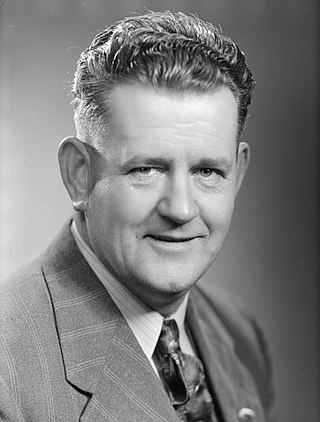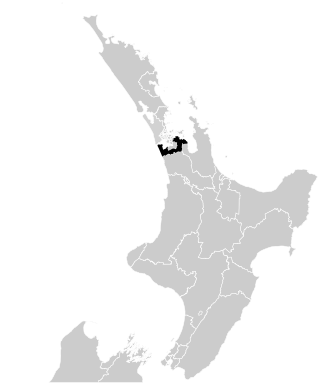
James Patrick Anderton was a New Zealand politician who led a succession of left-wing parties after leaving the Labour Party in 1989.

Sir Wallace Edward Rowling, commonly known as Bill Rowling, was a New Zealand politician who was the 30th prime minister of New Zealand from 1974 to 1975. He held office as the leader of the Labour Party.

The 39th New Zealand Parliament was a term of the Parliament of New Zealand which began with the general election held on 25 November 1978, and finished with the general election held on 28 November 1981. The dates of the Muldoon Ministry were from 13 December 1978 to 11 December 1981.
Matthew Peter Robson is a New Zealand politician. He was deputy leader of the Progressive Party, and served in the Parliament from 1996 to 2005, first as a member of the Alliance, then as a Progressive.

Richard John Northey is a New Zealand politician. He was an MP from 1984 to 1990, and again from 1993 to 1996. He served on the Auckland Council between 2010 and 2013, and is a member of the Labour Party.

The East Coast Bays by-election of 1980 was a by-election during the 39th New Zealand Parliament in the East Coast Bays electorate. It resulted in an upset for the National Party, as their candidate and future leader Don Brash was unexpectedly beaten by Gary Knapp of the Social Credit Party.

Hugh Watt was a New Zealand politician who was a Labour member of Parliament and the acting prime minister of New Zealand between 31 August and 6 September 1974, following the death of Prime Minister Norman Kirk. He had been the fifth deputy prime minister of New Zealand since 8 December 1972. Watt later served as high commissioner to the United Kingdom.
Frederick Miroslav Gerbic was a New Zealand politician of the Labour Party.
Frank Lewis Rogers was a New Zealand politician of the Labour Party.

Norman Vazey Douglas was a New Zealand trade unionist and left-wing politician. He joined the New Zealand Labour Party in 1932, but when John A. Lee was expelled from the party in 1940, Douglas followed to join the new Democratic Labour Party. He rejoined the Labour Party in 1952 and represented the Auckland Central electorate in Parliament from 1960 until his retirement in 1975, serving time on the Opposition front bench.
Malcolm Douglas is a former New Zealand politician of the Labour Party. He lives in Karaka south of Auckland.

Colin James Moyle was a New Zealand politician. A member of the Labour Party, he served as a Member of Parliament (MP) from 1963 to 1976 and again from 1981 to 1990. He was a Government minister in the Third Labour and Fourth Labour Governments. He was a close confidant of Bill Rowling during Rowling's short premiership. In the Fourth Labour Government, as Minister of Agriculture, Moyle oversaw the removal of farming subsidies and the establishment of a fisheries quota system.
Susanne Mary Wood served as the president of the New Zealand National Party from 1982 to 1986, the youngest person and the first woman to hold the post.
Reginald George Boorman was a New Zealand politician of the Labour Party.

The Hunua electorate existed three times for the New Zealand House of Representatives beginning in 1978, based at the south end of the Auckland urban area, and named for the Hunua Ranges. It covered different geographical areas over those periods. The electorate was last represented by Andrew Bayly of the National Party before its dissolution in 2020.

Dorothy Catherine Jelicich was a New Zealand politician of the Labour Party. She served one term in the House of Representatives representing the Hamilton West electorate, and was afterwards a city councillor in Hamilton and then Manukau.

Remuera is a former New Zealand parliamentary electorate, in the city of Auckland. It existed from 1938, when it replaced the Parnell electorate, until 1996. It was consistently held by members of the National Party.

The Mangere by-election of 1977 was a by-election for the electorate of Mangere on 26 March 1977 during the 38th New Zealand Parliament. The by-election resulted from the resignation of the previous member Colin Moyle after accusations against him in parliament, and he was replaced by David Lange, also of the Labour Party. Apart from Lange, there were seven other candidates in the by-election.

The Onehunga by-election 1953 was a by-election held in the Onehunga electorate in Auckland during the term of the 30th New Zealand Parliament, on 19 December 1953. The by-election was won by Hugh Watt of the Labour Party.
The Backbone club was a ginger group within the New Zealand Labour Party in the late 1980s and early 1990s that advocated neoliberal economic policies and supported Roger Douglas in his financial reforms of New Zealand. Its members later became the nucleus of ACT New Zealand, a neoliberal party which Douglas founded in 1994.












